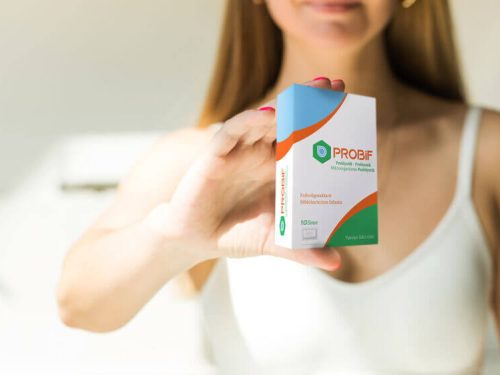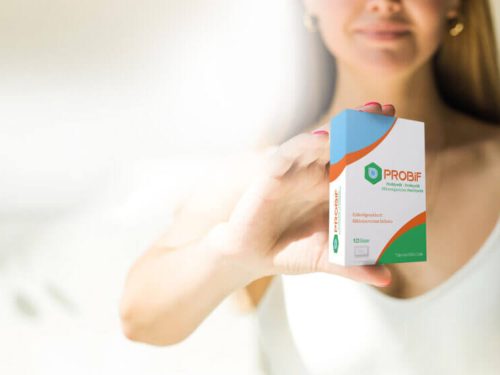PROBIF

Microorganisms living in the intestines are 96% bacteria (45% live in the small intestine and 55% live in the large intestine.) and 4% fungi and viruses.
Beneficial (probiotic) and harmful bacteria live in a balanced state in a healthy human gut. This balance is usually broken with diseases/processes such as diabetes, allergic and immune system diseases (asthma, urticaria, eczema, etc.), heart failure, inflammatory bowel diseases (ulcerative colitis, crohn), IBS (irritable bowel syndrome), cancer, chemotherapy, radiation therapy, autism, gynecological disorders such as endometriosis, previous abdominal surgeries (gallbladder removal, cesarean section, appendicitis operations, intestinal operations), SIBO (small intestinal bacterial overgrowth) in addition to environmental factors such as smoking, alcohol, irregular diet, stress, antibiotics and as a result intestinal bacterial flora disorder we call “dysbiosis” occurs. Dysbiosis is mostly the cause of the above-mentioned disorders.
These disorders often occur along with intestinal complaints such as bloating, gas, abdominal pain, constipation, persistent diarrhea that is resistant to treatment and techniques such as endoscopy and colonoscopy aren’t guarenteed to diagnose such disorders. Medication used to treat these disorders (gas reliever, bloating reducer) mostly aim to reduce the complaints and do not fully cure “Dysbiosis”.

According to the definition of the World Health Organization, probiotic bacteria are the bacteria that have proven beneficial for human health.
Although some probiotic bacteria are anaerobic and exist in the human intestine naturally (Bifidobacterium Infantis), they are mostly cultured and multiplied in the laboratories (Bifidobacterium BB-12, Lactobacillus species). The gut is responsible for 70% of the immunity of the human body. In the human intestine, these probiotic bacteria produce metabolites such as Butyric acid, Lactic acid and Propionic acid, thereby strengthening the intestinal cells by feeding them and playing an important role supporting the management of diseases by strengthening immunity. The most common probiotic bacteria in the market are Bifidobacterium and Lactobacillus species whereas Sacchoromyces species are fungal probiotics. Commercially available probiotics mainly consist of multiple bacteria containing Bifidobacterium and Lactobacillus, but their use may be ineffective because they contain a large number of bacteria. There are studies that indicate that the Bifidobacteria levels in the intestines decrease in cases such as Covid, which adversely affect the immune system and that supporting the bifidobacteria levels is important for the recovery of the disease.
10 billion Bifidobacterium Infantis found in 1 sachet of Probif are naturally present in the human intestinal structure. It is the only bacteria found in the intestinal structure of newborn babies during the first 10 days and if its amount decreases over the years probability of occurrence of the diseases mentioned above increases. According to the studies, the higher the B. Infantis levels are the less the incidence of intestinal and related disorders. In addition to its immune-enhancing effects, with our study in collaboration with YTÜ (Yildiz Technical University), we have shown that it completely destroys microplastic polypropylene (the most commonly used, most common type of microplastic). Each week we accumulate microplastics as big as a credit card in our intestines through foods, beverages we consume and respiration. The booster in Probif, high-dose Bif.Infantis, destroys microplastics in the intestine and prevents their accumulation in other organs such as the lungs.

Prebiotics are known as food for probiotic bacteria; they are mainly carbohydrate / sugar groups such as Inulin, Galactooligosaccharide, Fructooligosaccharide, Xylooligosaccharide.
However, their use is not very common because these prebiotics are mostly consumed by harmful bacteria. Probif, for the first time in the world, consists 1 gr. plant-derived prebiotic xylooligosaccharide which doesn’t raise blood sugar and is quite safe because only Bifidobacterium species can consume this prebiotic. Studies show Bifidobacterium levels increase 3-5 times in the presence of xylooligosaccharides.

Postbiotics, which is a fairly new concept and which for the first time in the world
will be included in Probif after its usage in China, are defined as bioactive soluble factors (products or metabolic by-products) produced by living microorganisms and provide some physiological benefits to the host after cell breakage. Alginic Acid (Alginate), which is a postbiotic included in Probif, is obtained from the cell wall of brown seaweed and is a product that has positive effects on the intestine and the stomach and is also used as a food thickener. In our study with YTÜ for the first time in the world, we showed that Bifidobacterium Infantisin multiplies and spreads more in the presence of Alginic acid, thus proving the compatibility of algae and probiotic bacteria for the first time.
REFERENCES
2- https://pubmed.ncbi.nlm.nih.gov/33103512/
3- https://bmjopengastro.bmj.com/content/9/1/e000871
4-https://www.inderscienceonline.com/doi/abs/10.1504/IJGW.2022.122435
5- https://journals.sagepub.com/doi/full/10.1177/2058739220942626
6-https://onlinelibrary.wiley.com/doi/abs/10.1002/app.52086

